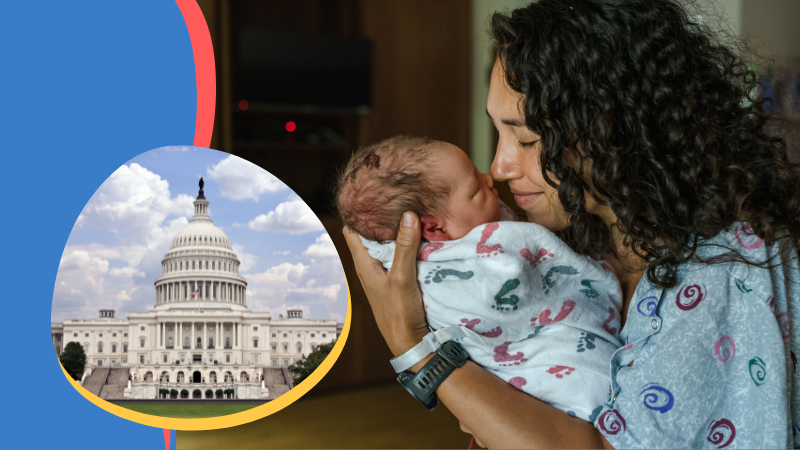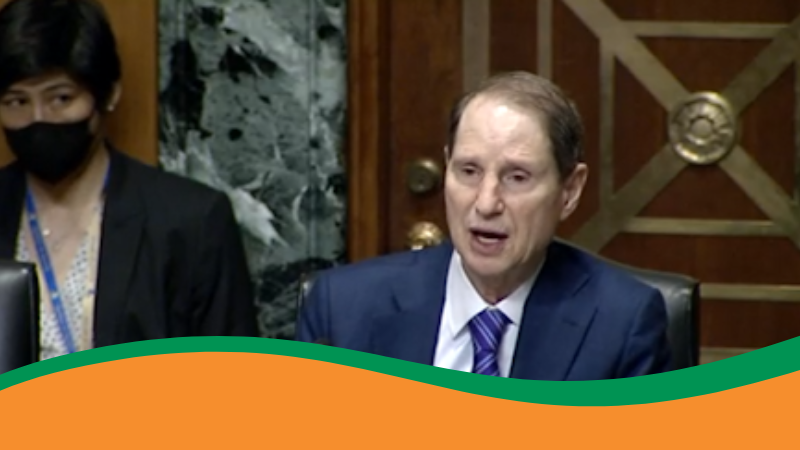This blog was updated on July 29, 2024, to add an action noted in the Blue Print that was taken by the Administration though not mentioned in the Blue Print progress report.
Our work shaping and reporting on national mental health policy is made possible through a capacity grant from the Perigee Fund.
On July 10, Vice President Harris announced the Administration’s progress on improving maternal health across the country since the release of the Blueprint for Addressing the Maternal Health Crisis.
In 2022, the White House released a Blueprint for Addressing the Maternal Health Crisis, and the Policy Center (then 2020 Mom) analyzed the report to detail the maternal mental health (MMH) related proposals. Our ‘open letter’ to the White House identified gaps in the Blueprint relative to MMH.
Updates in the July 10 Progress Report
The key maternal mental health activities highlighted in the report include:
Maternal Mental Health and Substance Use Disorder Training:
Through the HRSA Telepsychiatry State Grant program, nearly 2,000 providers were trained to screen, assess, treat, and refer for maternal mental health and substance use disorders.
Extended Postpartum Medicaid Coverage:
The American Rescue Plan and full year (FY) 2023 Consolidated Appropriations Act funding bill allowed states to extend postpartum Medicaid coverage from 2 to 12 months, ensuring continued care during the critical postpartum period. To date, 46 states, D.C., and the U.S. Virgin Islands have implemented this extension.
National Maternal Mental Health Hotline:
The National Maternal Mental Health Hotline which offers free, confidential, 24/7 support to new mothers and their families, addressing behavioral health issues like maternal depression, has assisted nearly 38,000 individuals since its launch in 2022.
Our Reaction
The above-mentioned programs were required by Congress, and it’s helpful to see a centralized reporting of progress from these programs. The Federal Maternal Mental Health Task Force was not mentioned in the Vice President’s report, which is unfortunate, as the Task Force report to Congress and strategic plan have the potential to significantly change policies and outcomes.
Further, our prior response and requests were not addressed, specifically:
Obstetric care providers should all be aligned to a state or national psychiatric provider-to-provider consultation program to receive training/support in addressing MMH disorder and Maternal SUD diagnostic assessment and treatment plan development/deployment, including support in prescribing given the need to understand research and risk regarding drug treatment during pregnancy/lactation.
Though local communities shouldn’t have to address maternal mental health/SUD on their own, it would be preferred that a responsive healthcare system be in place, some communities and states have formed new or employed existing coalitions to address MMH, including addressing local treatment shortages/referral pathways through training of existing providers, structuring support groups and disseminating educational materials and leading awareness campaigns.
Additionally, the Policy Center has provided guidance to the Centers for Medicaid and Medicare Services (CMS), the Department of Labor’s Employee Security Benefits Administration (DOL/EBSA), and the Federal Maternal Mental Health Task Force. Though we have had multiple productive conversations with the White House, CMS, and the DOL, the administration has not yet substantively addressed these requests.
Further, the 2022 Blueprint noted the following actions would be taken. Though the July progress report did not address these points, SAMHSA has confirmed these two actions have occurred:
1.13. Appoint a head of women’s mental health and substance use. HHS will hire a dedicated Associate Administrator for Women’s Services in HHS’s Substance Abuse and Mental Health Services Administration (SAMHSA) to lead its efforts on promoting positive mental health during pregnancy and in the postpartum period.
Dr. Nima Sheth was appointed to this role, and she serves as the lead facilitator of the Maternal Mental Health Task Force.
1.15. Integrate behavioral health supports in community settings.
Last week the Substance Abuse and Mental Health Services Administration (SAMHSA) released a notice of funding opportunity (NOFO) for maternal mental health in community-based settings. Learn more here.
Overall we applaud the Administration for further shining a spotlight on the maternal health crisis, and we challenge this administration, future administrations, and Congress to be laser-focused on robust systems change, including addressing the barriers to maternal mental health integration into obstetricians and midwives (payment reform and measurement of screening and treatment rates), bringing community-based services into the health delivery system (supporting contracting and billing), financially supporting training of more maternal mental health providers maternal mental health care deserts, and aggressively addressing obstetric care deserts/standing up Maternity Care Centers.
Mothers and providers don’t need more grants and bandaids, we need the system to work.



